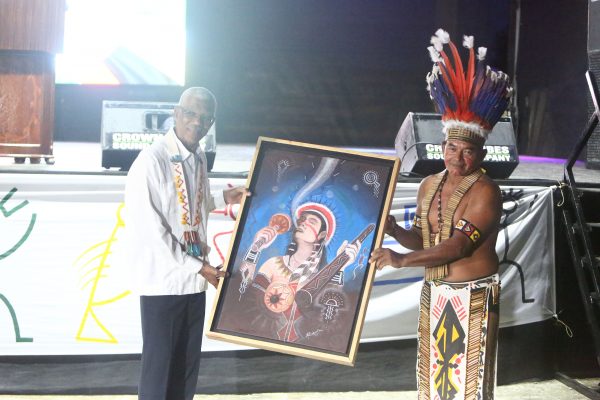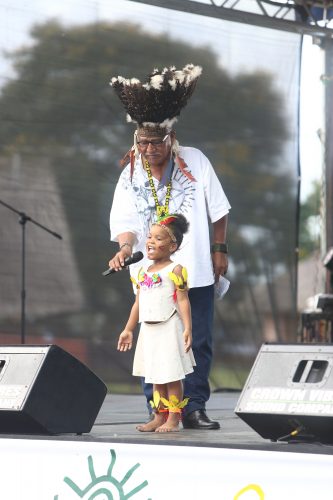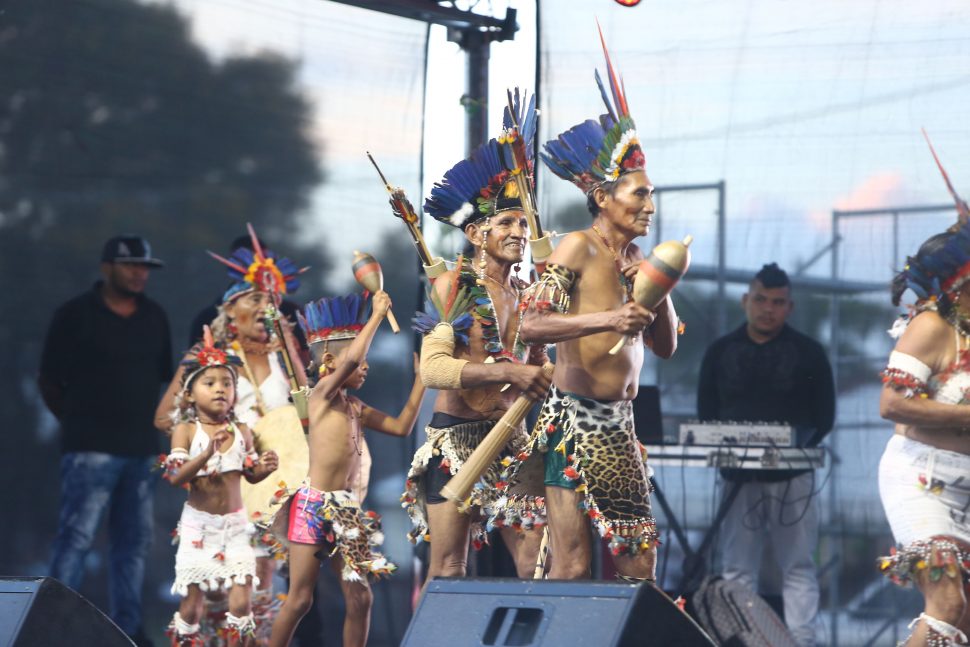President David Granger yesterday reiterated the government’s commitment to eliminating the gap in development between the hinterland and the coastland, while saying it is taking steps to improve access to education as it is the fastest way to address inequalities.
“We are all Guyanese and Guyanese citizenship guarantees equal rights and equal opportunities for all. It, therefore, means that any government must make it its prime concern and focus, the elimination of inequality, particularly inequalities between residents of the coastland and the hinterland,” Granger told the audience as he delivered the feature address at the launch of Indigenous Heritage Month 2018 at the Sophia Exhibition Centre.
In closing, the President reaffirmed government’s commitment to eradicating poverty and inequality of the indigenous peoples.

“The Indigenous Peoples can now be assured that there is a government aiming at eradicating poverty and eliminating inequalities. Indigenous Heritage Month is not only a celebration of the rich customs and traditions of our indigenous peoples, these traditions and customs are valued through all parts of our patrimony and they benefit all Guyanese but more than anything else is an opportunity for us to eliminate poverty and inequalities and look to the future as one people with one common destiny,” he later added.
This year’s Indigenous Heritage Month is being celebrated under the theme “Proud of our Indigenous Identity-Celebrating in Unity.”
Granger mentioned policies to empower the indigenous peoples, saying that empowerment has been effected through “education, employment opportunities, economic enterprises, energy generation, improvement of infrastructure, land rights, reduction of poverty, extension of public services” and cultural development.
However, he singled out education. “We are concerned with eliminating inequalities among the Guyanese people and we believe that education is the surest and swiftest way to eliminate inequalities. The government, therefore, is taking steps to improve hinterland education access, attendance and attainment,” he added, before alluding to the construction, extension and repairs of several schools and dormitories in the hinterland region.
School attendance has increased as well, he said, through the hinterland school feeding programme and transportation.
Another area of focus for government as it works to bridge the gap is the stimulation of village economies through the support and development of agro-processing and micro- enterprises.

“There is a silent evolution of agro-processing and micro-enterprise taking place in more than 200 indigenous communities. These enterprises will help to reduce inequality and will help to provide wealth in households of indigenous peoples in hinterland. Employment is essential to eliminating poverty and so the Hinterland Employ-ment Youth Service is providing training and seed capital to engage young people in economic enterprises. Grants have been provided to 3,795 young persons, simulating 2,000 small businesses, including some partnerships,” he added.
The president also made mention of government’s efforts to introduce renewable energy sources to meet the demands in the hinterland, improvement of hinterland roads, infrastructure, provision of transportation, access to public services and language classes in the Arawak, Carib and Warrau languages that are benefitting more than 220 students in Kwebana and Waramuri.
“And these instructions have been passed not only to indigenous communities but also the Police Force, Defence Force and to some sections of the public service. It is unacceptable for these policemen and soldiers to go into Warrau communities, Carib communities, Wapishan communities, Akawaio communities, Arecuna communities and they cannot communicate with the residents in the languages that they best understand,” Granger said.
“My brothers and sisters, all of these initiatives are meant to remove the differences between coastland and hinterland and give the residents of the hinterland similar or equal access to public services as residents on the coast,” he added.
Granger also took the opportunity to express his commitment and that of his government to working with the recently elected executive of the National Toshaos Council (NTC).
“The newly elected Toshaos Council under new chairmanship can expect fullest cooperation from the Ministry of Indigenous Peoples’ Affairs and Central Government. We are working for the common good and we will cooperate with the NTC to make sure that policies that we both embrace for the removal of inequalities be furthered during their tenure in office,” he said.
Earlier, Chairman of the NTC, Toshao Nicholas Fredericks, used the launch to call on the government to work with the indigenous peoples to bring an end to longstanding issues they have been faced with.
“It is our humble call that you open your doors to the NTC as you have been doing and we want to compliment the ministries for accepting the indigenous people’s proposals but we would like to see more, since there is always room for improvement… as we enter this month we want to make sure that we are celebrating in a meaningful way and a respectable manner, recognising the contributions we, the indigenous peoples, have made and will continue to contribute,” the Chief Toshao said.
Further, Minister of Indigenous Peoples’ Affairs Sydney Allicock in his remarks spoke of the role of the Indigenous peoples in the transition to a “Green” state. “…It is the course your government remains committed to, one which seeks to unify our beautiful nation, the recognition of our rights as laid out in Article 149 G of the Constitution of Guyana by preserving and protecting our culture, tradition and way of life, which we celebrate this month… during this month we will see indigenous cultures bursting through the seams but we must be mindful that is should not just be this month but, rather, every day. We must continue to look for that unity, which I believe is possible once we put our differences aside and be true Guyanese…,” he added.






